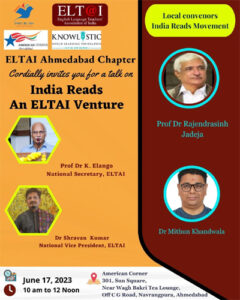- With the advent of digitalization, reading ceased to be a hobby of young students and the present generation needs to realise the importance of reading: Prof K Elango, general secretary, ELTAI
- ‘Reading is the mother of all skills’ and any loss of it will inevitably lead to natural death of other skills such as speaking, writing, and listening
- The movement is to be a student and public-led one wherein everyone has a role and making reading their lifestyle
GOWRI MANICKAVASAGAM
AHMEDABAD, JUNE 14
As part of its efforts to promote reading in educational institutions, the English Language Teachers’ Association of India (ELTAI), a 50-year-old voluntary organization, is launching the movement, “India Reads” in association with its local chapters in three cities of Gujarat this week, said Prof K Elango, general secretary, ELTAI on Wednesday.

Accordingly, the first event will be organized by ELTAI Anand Chapter at HM Patel Institute in Anand between 10 am and noon on Friday, June 16. The local coordinators are Prof Dr Rajendrasinh Jadeja and Dr Mannus Thaker. ELTAI national vice president Dr Shravan Kumar will also participate in the programme.
The second event will be organized by ELTAI Ahmedabad Chapter in association with American Corner, Knowlostic (World Learning Foundation) between 10 am and noon on Saturday, June 17. The venue will be American Corner, 301, Sun Square, near Wagh Bakri Tea Lounge, Dr Umashankar Joshi Marg, off CG Road, Navrangpura, Ahmedabad. The local coordinators are Prof Dr Rajendrasinh Jadeja and Dr Mithun Khandwala.
The third event will be organized by ELTAI Rajkot Chapter at Swaminarayan Gurukul International School in Rajkot between 10 am and noon on Sunday, June 18. The local coordinators are Dr Vishal Varia and Minu Jasdanwala.
Speaking with navjeevanexpress.com, Prof K Elango said, “With the advent of digitalization, reading ceased to be a hobby of young students and the present generation needs to realise the importance of reading. To promote reading habits among learners from primary to university level, we are launching this nationwide movement. As the reading culture is in a downward spiral, the teachers fear that it would lead to an intellectual crisis and hence, wish it to be halted before it becomes a cognitive tsunami. Furthermore, readers are leaders and leaders are readers.”
True to its assertion, ‘Reading is the mother of all skills’ and any loss of it will inevitably lead to natural death of other skills such as speaking, writing, and listening. More significantly, thinking skills flaunted as most critical for the present century, in fact, for any century to come, will vanish into thin air, irretrievably. What Obama has observed sums up the significance of reading, “if you know how to read, then the whole world opens up to you.”
The movement as visualized by the association embodies several unique features and the most significant being its radical departure from academic reading. The academia mostly focuses narrowly on textbook reading, offering hardly any chance for learners to become readers, in its true sense. Textbooks demand a different approach as they are often read for the purposes of doing assignments and scoring marks in the examinations, necessitating intensive reading. No learner has expressed his liking for reading textbooks and hence, an alternative model is conceptualized to prompt learners to move beyond the textbooks, beyond teachers and beyond classroom to become extensive readers, that is, reading for joy and reading on one’s own volition.
While on a reading journey the main obstacle learners encounter is identifying the books that would engage them. Care must be taken as Francis Bacon graphically expressed, “Some books are to be tasted, others to be swallowed, and some few to be chewed and digested”, so when we live amidst 130 million books, since the time of Gutenberg, young learners obviously need signposts. But the damage the academia has done is limiting the range of genres in its curriculum – the multiple text types of fiction and nonfiction available are mindboggling, to illustrate, under fiction there are mystery novels, horror novels, romance novels, sci-fi, dystopian novels, micro fiction, and several others. Similarly, under nonfiction genres such as autobiographies, biographies, self-help books, scientific writings, business writings, travelogues and many more but rarely are they made familiar.
Yet another reading dimension the project incorporates is familiarizing learners with an array of reading skills and strategies. Among the host of them, there are previewing, predicting, questioning, inferencing, SQ3R, parallel reading, intertextuality, summarizing and so on. Readers must be in the know-how of what strategy to employ when they choose a book and the purpose for which they are reading it. Unfortunately, in our system learners are compelled to ‘memorize and reproduce’ hence, they approach any other text with the same strategy and thus limiting their reading speed and denying themselves of the scope of reading.
The teachers’ association is, therefore, launching a reading movement, along the lines of Chipko, to energize the entire country to emerge as the knowledge capital. Now, with 300 million students on the education ladder, plus with their 600 million parents we could transform the malaise of technology addiction to book reading, perhaps the only antidote available.
The movement is to be a student and public-led one wherein everyone has a role and making reading their lifestyle. It would undoubtedly shape our students to be self-learners, who can crack any competitive exam and prepare themselves for the non-existing jobs sans any external support.












